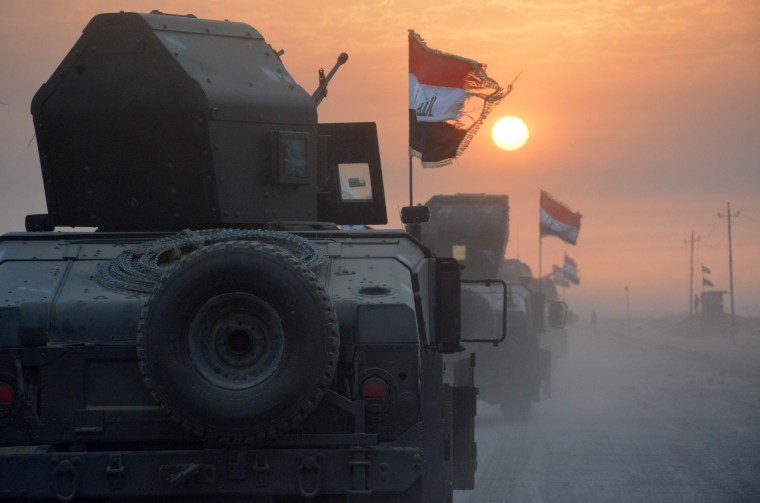The Iraqi army, directed by U.S. advisers, launched an offensive Sunday aimed at wresting Mosul from the hands of ISIS and ending its brutal two-year occupation.
"The time has come for the greatest victory," Iraqi Prime Minister Haider al-Abadi announced late Sunday on state TV. "I announce the start of Liberating Mosul Operation, by the will of Iraqis, and after depending on Allah."
Al-Abadi said that ISIS would be "punished" for its crimes and that the province's cities and villages will be rebuilt.
"We will rebuild what those criminals have destroyed," he said. "We will bring life back to Mosul and all other areas around Mosul."
In a statement, Secretary of Defense Ash Carter called the offensive a "decisive moment in the campaign to deliver [ISIS] a lasting defeat," and Brett McGurk, the State Department official coordinating the effort against group, said it would liberate Iraqis from "two years of darkness."
Though the operation began Sunday, its plans had been known long before.
Earlier Sunday, Hadi Al-Ameri, commander of the Badr Shiite organization; Ahmed Al-Asadi, a spokesman for the Popular Mobilization Forces, the militia coalition supporting the operation; and Gen. Shaker Jawdat, commander of the federal police, arrived at the military base in Qayyarah, a senior security official said.
Iraq's air force dropped leaflets warning Mosul residents that the liberators are coming, and the Baghdad government directed broadcasts directly into the heart of the occupied city.
"The entire city is booby-trapped"
Meanwhile, Iraqi forces have circled the country's second-largest city and cut off any supply — or escape — routes that the ISIS fighters holed-up in Mosul could use.
The army is following in the footsteps of Alexander the Great, the Persians, the Turks, the British and other conquerors who have fought over this ancient and strategic city on the Tigris River.
"It's going to be a bloody battle and a fight to the death for ISIS," David Phillips, who heads the Program on Peace-Building and Rights at Columbia University, told NBC News last week. "There is no escape for them."
Highway 47, which connects Mosul to the ISIS stronghold in Raqqa, Syria, "has been seized by Kurdish Peshmerga forces," Phillips said. "So they have no alternative but to fight to death."
Mosul's location — and the fact that it's in Iraq's oil producing region — is the reason ISIS is so determined to hang onto the city.
"It straddles a strategic transportation corridor connecting the Middle Eastern countries to Turkey and the West," Phillips said. "You don't really have to drive through Baghdad to get anywhere. But all the transport routes go through Mosul."
Seizing Mosul will not be easy for the Iraqi forces, who are preparing for guerrilla warfare against an enemy that has no problem using civilians as cover.
"The entire city is booby-trapped," Phillips said. "They've also dug a labyrinth of underground tunnels so they can pop up and shoot from different angles."
Earlier, McGurk warned that the Iraqis are taking on a ruthless and formidable foe.
"This will be a very unpredictable, very dynamic, very uncertain operation," McGurk said. "There are a lot of unknowns."
"We do not know what Daesh is going to do in Mosul," he added, using a U.S. government name for ISIS.
In addition, the fate of the thousands of Yazidi women whom ISIS fighters have taken as sex slaves and are believed to be holding in Mosul is one of the biggest unknowns.
"We're going to try to make sure that if Daesh escapes Mosul, which I don't think they'll be able to do, that they can't take these people with them," McGurk said. "It's one of most difficult questions, and we want to free these people. That's one of the key objectives of the operation."
In advance of the attack, McGurk said planners are working on a worst-case scenario that envisions 1 million internally displaced people. He said they are working with the Iraqi government, the Kurdish Regional government and various non-government organizations to position resources to help them. The operation has already raised $2.4 billion for humanitarian assistance.
"The plan is to keep people in their homes," McGurk said. "And the messaging that is ongoing now for the people of Mosul is to keep people in their homes."

The United States is also working closely with the Iraqis to set up a screening process to ensure that ISIS fighters masquerading as civilians don't slip through the cracks — and to keep in check the various ethnic and religious resistance forces that have been fighting against ISIS within the city.
The aim, McGurk said, is to "make sure that armed groups that are not fully under the full control of the Iraqi government are not part of the Mosul campaign."
Mosul is a cosmopolitan city that in normal times is home to about 2.5 million Assyrians, Kurds, Shabaks, Yazidis and Armenians, in addition to the Sunni Arabs. Historically, the city has been home to Christians and Jews, as well as Muslims. Since the war started, 1 million residents have fled Mosul.
"The concern is once ISIS is gone, Mosul residents will start settling scores with one another," Phillips told NBC News. "The fear is that Mosul could become another flashpoint for Iraq's further fragmentation."
U.S. military officials have not released any details about the attack, but they have made no secret it's going to happen.
The Iraqi government has also been beating the war drums.
"Today, you are closer than ever to being rid of the injustice, gore and brutality of Daesh," al-Abadi said in a recent radio broadcast.
Republican presidential nominee Donald Trump has complained that the warnings about the impending attack on Mosul have given ISIS leaders time to prepare.
Pentagon officials, however, say the strategy is aimed at bucking up Mosul residents and persuading the low-ranked ISIS fighters to give up before they are killed.

